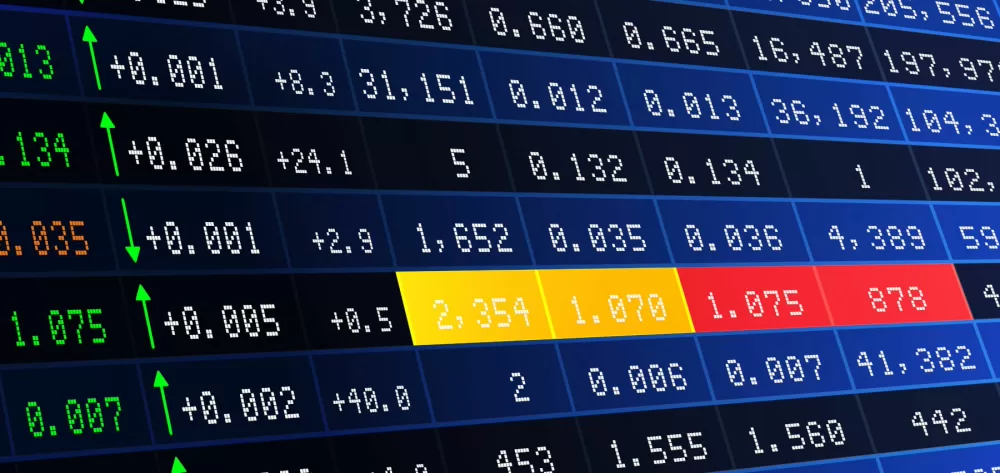Stock market traders generally have one primary goal, and that is to make the highest profit on their stocks. The golden rule of trading is just as straightforward: buy in at the lowest possible price and sell out at the highest possible price. «Buy low, sell high» is the simple motto which sums up everything you need to know about stock market trading.
Share prices: a closed book
While the motto may be simple, it can be surprisingly complicated to implement it in the real world. So-called «chartists» analyze market trends by following share prices. Their aim is to recognize future developments in the market based on existing data, and use this information to their gain.
Today the majority of rational investors share the opinion that there is no accurate way to predict, ahead of time, the ideal moment to buy or sell individual stocks. Not even through a detailed analysis of existing charts.
When investors manage to seize the perfect moment, it can usually be written off to chance, for the most part. Sometimes you get lucky, sometimes you get unlucky. The only thing that’s certain is that you’ll always be smarter in hindsight.
Fundamental analysts and index investors
Many of those who follow the principles of fundamental analysis believe that worrying about the perfect moment is a waste of time and nerves. Fundamental analysts, whose ranks include the likes of Warren Buffet, focus on thoroughly analyzing the relative value of the companies in question. The underlying theory: All stocks will rise and fall in keeping with stock market fluctuations, but the prices of undervalued shares will grow at an above average rate in the long-term.
Active management skeptics and passive ETF investors, on the other hand, consider detailed analysis of shares to be unnecessary in this age of transparent markets. Their argument is that, if you diversify your investments across a broad portfolio of stocks, you won’t be vulnerable to unforeseeable fluctuations affecting individual stocks. In this school of thought, hunting for undervalued shares is not only time-consuming, but also completely useless.
What is a share worth?
In spite of the increasing success of passive ETF investment vehicles, fundamental analysis maintains a large following. But analyzing stocks presents a significant challenge, particularly for beginner traders. Over the years, financial experts have developed a range of indicators and algorithms which assist in the evaluation of a share’s current worth. To some extent, the same tools can be used to predict the future development of share values.
When a company first lists itself on the stock market, a move known as «going public» or making an «initial public offering» (IPO), a lengthy process is used to evaluate and finally determine the initial, per-share price. An IPO’s share price may also be determined by auction, although this process is less common. The initial value of a share is the price at which it is first listed on a stock exchange. But the moment shares hit the stock exchange, their value begins to fluctuate, depending on developments in the company and market.
A first step used by analysts in the appraisal of a stock-exchange listed share, so much as its potential to gain in value is concerned, is to thoroughly evaluate the real worth of the company which issues the share. The logic is simple: If all the shares issued by a company combined do not exceed the actual value of the company which issues them, there’s a good chance that the price of those shares will go up. If the price of combined shares is greater than the value of the company they represent, you as an investor can expect to see the price of shares adjust to match the company’s real worth.
Indicators in share valuation
There are various indicators used to assess the value of a company and the estimated value of shares, and each of these has its own following among analysts.
By far the best known of these indicators is the price-to-earnings ratio or P/E ratio, which measures share prices against company profits. The rule of thumb here is: The more a share costs in relation to actual company profits, the higher its P/E ratio (and the higher its valuation). But because reported company profits are often very large and are easily influenced by accounting tricks or what’s popularly known as «cooking the books», the P/E ratio of shares is not a fail-proof indicator. Like fundamental analysis, this method of valuation is considered problematic by many experts.
The price-to-cash-flow (P/CF) ratio is another indicator of a share’s worth. This ratio measures the relation between the share price and per-share cashflow. Compared to the price-to-earnings ratio, a price-to-cash-flow ratio is less vulnerable to variations in accounting techniques. Both P/E ratios and P/CF ratios are relatively short-term indicators, because both company profits and cashflows are subject to major fluctuations.
The so-called PEG, or price-earning-growth ratio, differs from the P/E ratio in that it compares a share’s price to growth in company profits. But here again, the PEG does not provide an accurate prediction of a share’s future value because it relies on past profit growth data.
Both the price-to-book ratio (P/B ratio) and the price-sales ratio (P/S) are often considered longer term indicators, compared to P/E ratios. But as a rule, these indicators are only valid when rating share values in relation to the values of stocks in the same field or industry.
Aside from the established performance indicators, stock analysts make use of a series of non-relative valuation methods to establish a company’s value. One of these is discounted cash flow, or DCF, which balances estimated future cashflow against capital costs. Because there is no way to accurately predict future cashflow developments, the DCF method isn’t foolproof either.
Share valuation - an art?
Every stock valuation expert blends their own special cocktail from the buffet of available indicators and valuation methods, and processes the data provided by various indicators using their own special formulae. It isn’t uncommon for a particular set of indicators to be used when assessing stocks in a specific branch, because certain indicators are particularly relevant to specific industries.
Typically, non-relative valuation methods like discounted cash flow are used to estimate the value of companies in the growth stage. Relative indicators are normally used to calculate the worth of more established and stable companies. An in-depth comparison of shares in the same industry will usually prove invaluable. But comparing stocks across a variety of industries, on the other hand, is often problematic.
The fact that, out of the abundance of available indicators and valuation techniques, not one can accurately predict future stock values, makes it pretty clear that stock valuation is not a science. Those who enjoy the occasional lucky hand when picking stocks often like to think of stock valuation as an art, and of themselves as artists of sorts.
But at the end of the day, there is only one valuation method which we can strongly recommend, and that is investing based on the pleasure principle. While just as infallible (or fallible) as the widely-used techniques we listed above, it’s generally a lot more fun.
Why not buy shares in companies which you feel actually enrich your life? Or invest in businesses which deliver sustainable products, or other products which offer added social value? That way, if your investment doesn’t quite pan out the way you’d hoped, you’ll still have the comfort of knowing that you invested in something worthwhile.
More information:
Stock calculator
Swiss brokers compared
Custody fees at Swiss banks compared
Stock trading for free?
How to buy stocks: best tips

 Deal of the Day
Deal of the Day 











